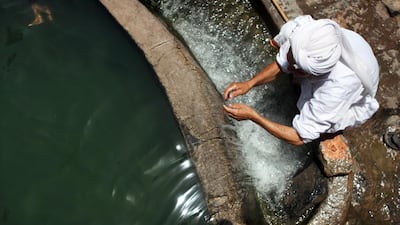Today, 36 per cent of the world’s population lives in water-scarce regions. If we continue mismanaging water as we do now, by 2050 half of the world’s population, half of global grain production and 45 per cent of GDP will be in water-stressed regions.
Water challenges threaten global social and political stability. The situation is critical: in the World Economic Forum’s 2015 Global Risks report, water was ranked as the global risk with the greatest potential effect on economies and societies over the next 10 years.
We must change our approach to water management. Our current model – a largely technical practice in which experts advise governments and water companies how to store, treat and manage water – simply isn’t working. There is, however, an alternative approach to water management. We’ve just somehow forgotten it.
Research brought together by the governance programme at AKU-ISMC suggests that traditional methods of water management in the Middle East based on a common social, cultural and religious heritage may provide a good starting point. The key is a sense of collective ownership of irrigation systems, water storage and treatment facilities: all parties do their bit to implement, uphold and protect water practices, because all parties need them to work.
As Dr Klaus Leisinger, president of the Global Values Alliance Foundation, frames it, "wicked problems" such as the water crisis cannot be solved, but only tamed. To do this, we need more than just technical expertise. We need a shared understanding of the problem and common moral ground.
Let’s begin with ethics. Somehow, in the technical management of water, the ethical dimension has all but been overlooked. Dr David Groenfeldt, founder and director of the Water-Culture Institute in New Mexico, United States, reminds us that ethics underlie just about every water decision, policy, practice and governance arrangement.
We need to treat the value-motivations of water suppliers as being just as important as technical information about water flows or economic data about fee payments. Take the creation of new water infrastructure such as a dam, levees, irrigation diversion or canals. Let’s consider five categories of water ethics.
There are environmental values and there are the economic values of conserving water, avoiding waste and making best use of water. We may consider social values about human health and well-being, but how often do we include cultural values about identity and one's spiritual and personal relationship to the water environment? And what, too, of governance values around participation, transparency and accountability in managing water resources?
Framing the decision to dam or not to dam, or build this or that facility to treat water, suddenly becomes a lot more complex. But, critically, if we get it right, it has a lot more support from stakeholders. We’re less likely to see water wasted, stolen or used as a pawn in tribal or political conflict when all parties feel that they have a stake in the management of that water.
Dr Abdou Filali-Ansary, former director of the Aga Khan University Institute for the Study of Muslim Civilisations, points out that in the past in the Middle East, the challenges in the management of water resources were met by creative regulation systems based on norms from, and legitimised through, interpretations of holy texts. The ways and means of water management were legitimised by values derived from local religious beliefs. This lent them popular support, and allowed them to be maintained, refined and even updated in ways that served communities directly. Critically, this approach was independent from the central branches of the state. Collective responsibility buffered water management from personal power struggles, political shifts and even conflict.
It can do this again.
In the Middle East today, applying ethics awareness to water management could involve looking to the past to find a common platform for decision-making based on traditional values associated with water ecosystems and governance.
A code of ethics which lays out the principles important to stakeholders can provide a starting point for building consensus. The development of a global "Water Ethics Charter" which is currently being undertaken by the Water-Culture Institute, Unesco and others can help provide a common language for discussing water governance and development options.
Large water infrastructure projects and industries such as mining and oil and gas, which affect water, are the obvious contexts where a code of value principles would be useful at the earliest stages of planning. But less dramatic developments, such as agricultural intensification programmes, also need to address values.
It would be an illusion to believe there are any quick solutions. There will be no quantum leap from where we are now to selfless sustainability in global water consumption, especially if the global rich continue to use resources at the pace they do.
However, if we look to the past, there is hope. We must base dialogue on common values and mutually appreciated moral principles. This is the beginning. If all stakeholders have the same understanding of the problem and what the solution might look like – first nationally, then regionally and eventually globally – it could set the course for a better mutual understanding and eventually better management. It’s the best option we have.
David Taylor is director of the Aga Khan University Institute for the Study of Muslim Civilisations, in London

